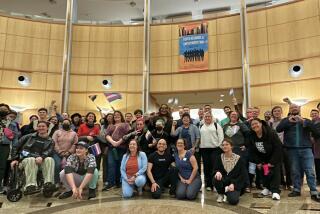Lynwood Rethinks AIDS Stance, Seeks State, Federal Action
LYNWOOD â Taking a more guarded approach than two weeks ago, the City Council unanimously passed a resolution Tuesday asking Gov. George Deukmejian and President Reagan to declare a state of emergency on AIDS and requesting more funds for the medical care of AIDS victims.
Councilman Robert Henning, who proposed the resolution Tuesday night, softened his call of Aug. 20 for an outright quarantine of AIDS victim and instead said a special hospital setting should be established where the victims can get up-to-date medical care.
Although a resolution requesting a quarantine was approved two weeks ago, it was rescinded the next day when the council met to finish a long agenda. Henning said he was not present at the second gathering.
Not Distributed
Rescinding the resolution, City Clerk Andrea Hooper said, simply meant it would not be mailed out to the state and county health departments. The new resolution supersedes the old one, she said.
Mayor John Byork, who had refused to sign the first resolution, said in an interview that he had concerns about a quarantine because âthe county health people say (AIDS) is not contagious. Iâm not sure why I would choose to second-guess somebody that knows more than I do.â
Councilman E. L. Morris said that although the new resolution calling for federally financed studies was a âvery kind gesture,â he suggested the council should look at AIDS âa little more carefully before we pass a resolution.â
After further discussion on requesting federal funds, however, Morris agreed to the resolution. Councilman Louis Thompson added: âI donât think itâs necessary to say the answer is quarantine. Iâm all for sending a letter . . . to see to it that funds are given.â
Favors Sending Message
Before the meeting, Henning said the new resolution was important to send a message to government officials to take more âaggressive action.â
âItâs important to take a stand on this issue,â Henning said. âWe need to take a stand. Politicians need to take a stand.â
Henning said he still favors a quarantine, adding that victims should be put âin a hospital setting where they can get proper medical help.â
âWe need federal funding to open up a specialized hospital. We canât sit back and let this disease run amok.â
Henning said he proposed the resolutions because he was alarmed at the recent Los Angeles city ordinance that would allow children with AIDS to attend public school. âI have a kid in school. I donât want him to catch it. That was totally upsetting,â he said.
The Los Angeles City Council ordinance, which went into effect Aug. 16, prohibits discrimination against AIDS victims in restaurants, schools and in rental housing. The ordinance also bars employers from firing or refusing to hire AIDS victims.
An unsigned flyer that was distributed last week had called for an AIDS quarantine rally to be held before the meeting in front of the Lynwood City Hall, but the rally never materialized. Henning said the people who circulated the flyer are afraid to speak out. But he said he agrees with the flyer, which asks, âDid you know, you or your family could catch AIDS from mosquitoes, fleas, bed bugs, body lice and other blood-sucking insects?â
Contention âNot Provenâ
âAnything that bites you can carry that disease,â Henning said.
That contention is not a proven fact, said Sally Jue, a social worker with the AIDS Project Los Angeles. âItâs inaccurate. If that were the case, we would have more people with AIDS.â
Dr. Shirley Fannin, associate deputy director for communicable disease control in Los Angeles County, said studies are being done on insects, but at this point it is a âhypothesis without much scientific information to support it.â
âItâs a risk-group disease,â she said. âA casually transmitted disease does not select a risk group. It would be distributed to young and old, male and female.â The high-risk groups are gay and bisexual men, intravenous drug abusers, hemophiliacs and to a smaller degree, blood transfusion patients, Fannin said.
Public health officials have said AIDS is transmitted primarily by the exchange of body fluids, such as blood, saliva and semen.
Since the acquired immune deficiency syndrome was first diagnosed in 1981, Fannin said, data has been gathered from over 12,000 reported cases nationwide, and locally from the 1,060 known cases of AIDS in Los Angeles through July 31. Fannin said that although a lot is not known about the disease, facts about transmission and the potential for transmission are among the things that are known.
âIt gets kind of silly when people start talking about getting it from an elevator button someone pushed.â
Because AIDS is not casually transmitted, she said, there would be no reason to quarantine AIDS victims. âIf a person is not going to be transmitting, why would you put them in a hospital at a cost of $500 a day? It doesnât make any rational sense.â
More to Read
Sign up for Essential California
The most important California stories and recommendations in your inbox every morning.
You may occasionally receive promotional content from the Los Angeles Times.










